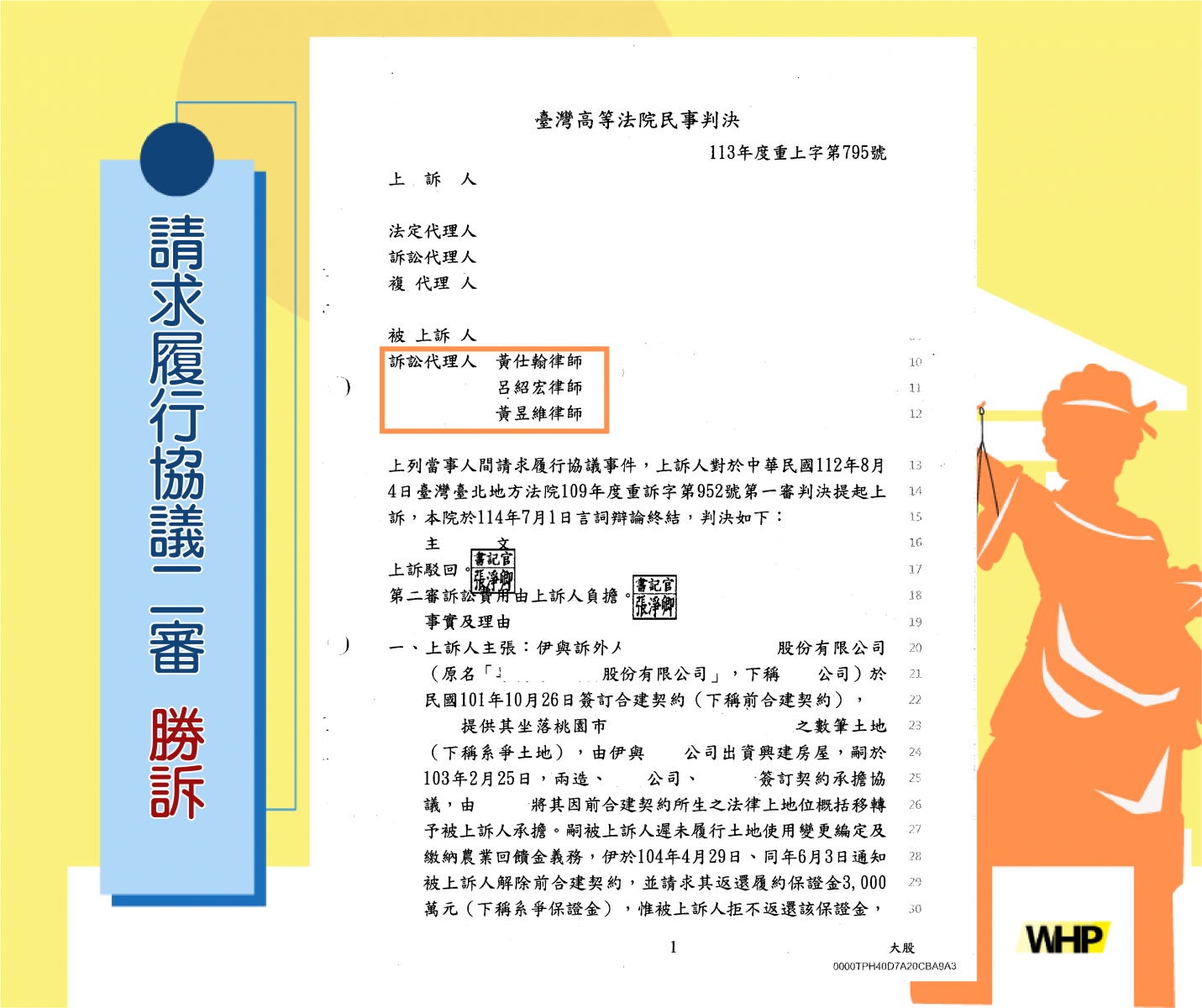首頁 > Case Studies
Case Studies | Civil | Joint Construction Dispute Requesting Performance of Agreement Case

Relevant Legal Provisions
Civil Code Article 259:When a contract is rescinded, both parties have the obligation to restore the original status, unless otherwise provided by law or stipulated in the contract, in accordance with the following provisions:
Any performance received from the other party shall be returned.
If the performance received is money, repayment shall include interest accruing from the time of receipt.
If the performance received is labor or the use of property, repayment shall be made in money according to its value at the time of receipt.
If the performance received has produced fruits (yields), such fruits shall be returned.
For necessary or beneficial expenses incurred on the object to be returned, reimbursement may be claimed within the scope of the benefit the other party obtains upon the return.
If the object to be returned has been damaged, lost, or otherwise cannot be returned, its value shall be reimbursed.
Facts and Reasons
This case concerns a joint construction contract dispute, specifically regarding the issue of returning the performance guarantee deposit. The appellee argued that since the settlement had not yet been completed, the appellant was not entitled to request the return of the deposit. Furthermore, the disputed agreement was the result of mutual negotiation and discussion between both parties, and therefore contained nothing improper. The court of first instance ruled in our favor, and the plaintiff, dissatisfied with the decision, filed an appeal.
Judgment
In the case concerning the request to perform the agreement between the above parties, the appeal is dismissed.
Although the appellant argued that the agreement was drafted by the appellee’s attorney and thus should be interpreted against the drafter, the result of the subsequent joint construction contract would cause the appellee to receive a smaller amount compared to the previous contract. Moreover, according to witness testimony, the disputed agreement was signed through mutual consent of both parties, not unilaterally drafted by the appellee. Therefore, the appellant’s argument cannot be adopted.
The appellant possessed sufficient ability to fully understand the rights, obligations, and legal effects of the contract signed, and was by no means the weaker party. The disputed agreement, which required the appellee to bear delay interest in order to prevent the appellee from postponing the settlement date, does not in itself constitute evident unfairness. In summary, the company has already completed settlement with the appellee, yet the amount jointly obtained from sales by the appellee and the company did not exceed the amount stipulated in the agreement. Accordingly, the appellant may not further request the appellee to pay any additional sum. Furthermore, the disputed agreement does not contravene principles of contract law, equality, public order and good morals, or good faith.
The original judgment, which ruled against the appellant, was not improper. The appellant’s contention that the original judgment was inappropriate and should be overturned lacks merit, and the appeal shall therefore be dismissed.
(Note: To protect the client's interests, certain case details and judgment images have been redacted and modified. For a full review of the case, please refer to Judicial Yuan's judgment database)
Attorneys:Vincent Huang、Herman Lyu、Webber Huang
-
11.25 2025Case Studies
Criminal | Forgery of Documents, etc. Successfully...
-
11.18 2025Case Studies
Civil Case | Defendant’s Claim for Damages Success...
-
11.11 2025Case Studies
Criminal | Violation of Anti-Money Laundering Act,...
-
10.28 2025Case Studies
Criminal Case | Defendant Acquitted of Hit-and-Run...
-
10.21 2025Case Studies
Criminal Case | Defendant Charged with Forgery Acq...
-
10.14 2025Case Studies
Assisted in the Division of Co-owned Property and ...
-
09.30 2025Case Studies
Defendant – Offenses Against Sexual Autonomy Appea...
-
09.23 2025Case Studies
Criminal | Defendant Charged with Embezzlement in ...
-
09.16 2025Case Studies
Criminal | Case of Infringement of Sexual Privacy ...
-
09.09 2025Case Studies
Request for Ownership Transfer Registration – Plai...
-
09.02 2025Case Studies
Civil | Joint Construction Dispute Requesting Perf...
-
08.26 2025Case Studies
Criminal | Defendant Charged with Aggravated Fraud...
-
08.19 2025Case Studies
Internal Company Dispute Defendant Forged Document...
-
08.12 2025Case Studies
Civil Case | Check Dishonored – Claim for Loan Rep...
-
08.05 2025Case Studies
Heavy Motorcycle Rear-End Collision, Lawsuit for N...